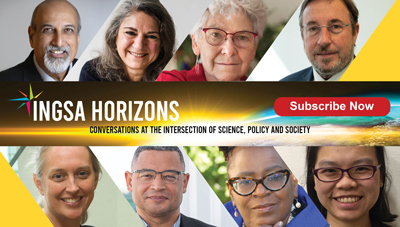
The INGSA Horizons Video Interview Series
2023
2021-2022
Harmonising the Dichotomy: Development & Sustainability
There is a great tension between social justice, development, and sustainability. Yet they are complementary and you need to address all of them if any of them are to be achieved.
Joanna Chataway – Re-imagining research excellence & cultures of policymaking
What would it take to changing cultures of policymaking, & rethink the definition of research excellence? What are the challenges of being a practitioner at the coalface?
Dr Clarissa Rios Rojas – Catastrophic Risk & the Rights of Future Generations
What is Global Catastrophic Risk and why are some countries instituting policies protecting the rights of Future Generations?








